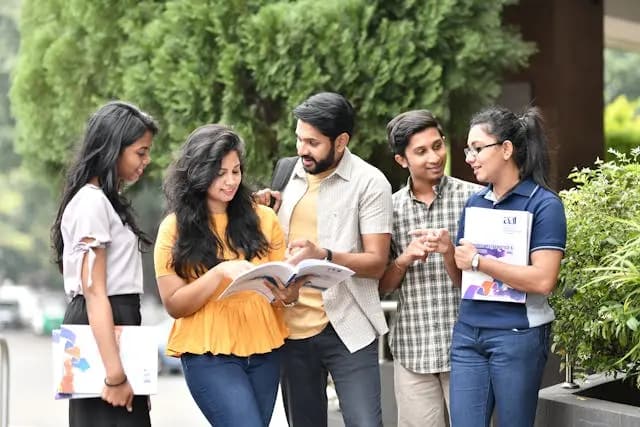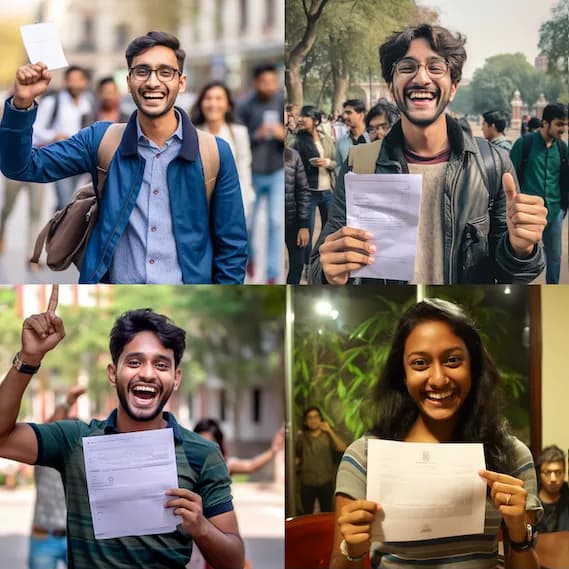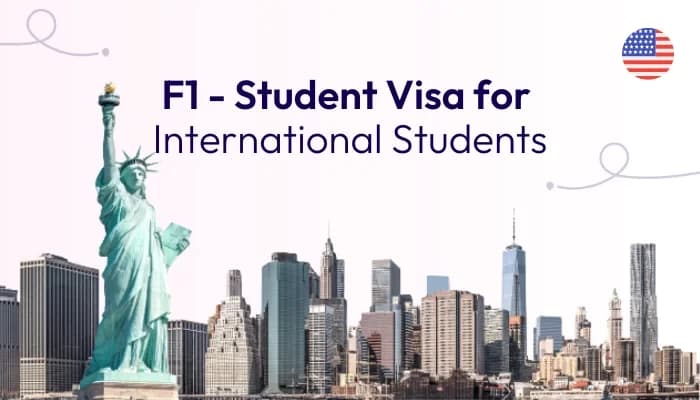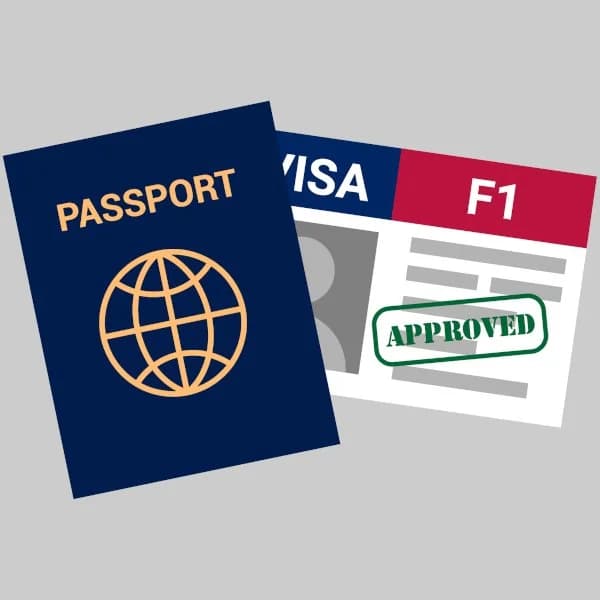Top 10 F1 Visa Interview Questions for Indian Students

Key Highlights
- Explain your genuine reasons for wanting to study in the U.S., focusing on education quality.
- Detail why you chose your specific university, mentioning unique programs or faculty.
- Show how your chosen course aligns with your long-term career goals.
- Be clear about your funding sources, including scholarships or family support.
- Emphasize your plans to return to your home country after graduation.
Preparing for an F1 visa interview can be daunting, especially if you’re an Indian student dreaming of studying in the United States. But don’t worry, we’ve got your back! This article will walk you through the top 10 questions you might face during your F1 visa interview. We’ll provide you with practical tips and sample answers, so you’ll walk into that interview room feeling confident and ready. Remember, this isn’t just about giving the “right” answers—it’s about convincing the visa officer that you are genuinely committed to your studies and that you have a clear plan for your future. So, let’s dive in!
1. Why Do You Want to Study in the United States?
This question is almost guaranteed to pop up. The visa officer wants to understand why you’ve chosen the U.S. over other countries. They’re looking for your genuine interest in the American education system, not just because it’s “cool” to study in the U.S.
Tip: Focus on the unique aspects of the U.S. education system that align with your academic and career goals. Mention any research, professors, or facilities that particularly attracted you.
Sample Answer 1:
“I want to study in the United States because it offers cutting-edge research facilities, especially in the field of Computer Science. The U.S. is home to many of the top tech companies, and I believe that studying there will give me the skills and exposure I need to excel in the technology industry. Additionally, the diverse cultural environment will help me develop a global perspective, which is crucial in today’s interconnected world.”
Sample Answer 2:
“The United States is renowned for its advanced education system and opportunities for hands-on learning, especially in biology. The research opportunities available at American universities, coupled with the chance to work with leading scientists, will allow me to contribute to the field of genetics, which is my area of interest. The flexibility in the U.S. education system will also enable me to explore interdisciplinary studies that aren’t available in India.”
2. Why Did You Choose This University?
Here, the visa officer is checking if you’ve done your homework. They want to know why you’ve picked this particular university out of the thousands available.
Tip: Be specific. Mention the programs, faculty, and facilities that stood out to you. Avoid generic statements like “because it’s a good university.”
Sample Answer 1:
“I chose the University of California, Berkeley because of its strong focus on entrepreneurship within the MBA program. The opportunity to learn from professors who have real-world experience in building successful startups, along with the university’s connections in Silicon Valley, makes it the perfect place for me to develop my business skills. The program’s emphasis on innovation aligns with my goal to start my own tech company in India after graduation.”
Sample Answer 2:
“I selected New York University because of its highly respected Psychology program. The chance to study under Dr. XYZ, whose work on cognitive behavioral therapy has been influential in the field, was a significant factor in my decision. NYU also offers extensive clinical training opportunities in its affiliated hospitals, which is essential for my career aspirations to become a clinical psychologist.”
3. What Are Your Career Goals?
This question helps the visa officer determine whether your studies are aligned with a clear career path. They want to know you’re serious about your education and have a plan for your future.
Tip: Link your chosen course of study with your long-term career goals. Show that your education is a stepping stone to achieving something bigger.
Sample Answer 1:
“My long-term career goal is to become a financial analyst specializing in emerging markets. The Master’s program in Finance at the University of Texas at Austin will provide me with the analytical tools and knowledge I need to excel in this field. After gaining some experience in the U.S., I plan to return to India and work with one of the leading financial firms, contributing to the growth of India’s economy.”
Sample Answer 2:
“I aim to become a data scientist and eventually lead a team of analysts in an international tech company. The Master’s program in Data Science at Stanford University is known for its rigorous curriculum and strong industry connections. The skills I will acquire there will allow me to tackle complex problems and innovate in the field of artificial intelligence. After completing my degree, I plan to work in the U.S. for a few years to gain practical experience before returning to India to start my own AI consultancy.”
4. How Will You Fund Your Education?
This is a critical question. The visa officer needs to be convinced that you have the financial means to support yourself throughout your studies.
Tip: Be clear and precise about your funding sources. Mention scholarships, family support, loans, or any other means of financing your education.
Sample Answer 1:
“My parents will be funding my education. They have set aside a significant amount of savings specifically for my studies abroad. Additionally, I have secured a partial scholarship from the university that will cover 30% of my tuition fees. We have also taken out an education loan to ensure that all expenses are covered without any financial burden.”
Sample Answer 2:
“I have a combination of funding sources. My parents will cover the majority of my expenses, and I have also been awarded a merit-based scholarship by the university, which will cover half of my tuition fees. We have also set aside additional funds to cover living expenses, and I have taken out a small student loan to ensure that I am fully prepared.”
5. What Are Your Plans After Graduation?
The visa officer wants to know if you intend to return to your home country after your studies. This is a key question, as they need to be sure you won’t overstay your visa.
Tip: Emphasize your connection to India and your intention to return after completing your studies.
Sample Answer 1:
“After completing my MBA, I plan to return to India and join my family’s business. We are in the process of expanding into new markets, and the skills and knowledge I gain from my studies will be invaluable in helping our business grow. My goal is to introduce innovative management practices that I will learn in the U.S., which will help us compete globally.”
Sample Answer 2:
“Once I have completed my Master’s in Environmental Science, I plan to return to India and work with an NGO focused on sustainable development. I am passionate about addressing environmental issues in India, and I believe that the knowledge I gain in the U.S. will equip me to make a significant impact. My long-term goal is to lead a team of environmental researchers in India.”
6. Do You Have Any Relatives in the United States?
This question is designed to understand your ties to the U.S. and whether you have a strong reason to return to India after your studies.
Tip: Be honest but concise. If you have relatives, mention them briefly and emphasize your focus on your studies.
Sample Answer 1:
“I have an uncle who lives in New Jersey, but I am not very close to him. My primary focus is on my studies, and I intend to return to India after completing my degree. My entire family, including my parents and siblings, are in India, and I plan to join them after graduation.”
Sample Answer 2:
“I have a cousin who is currently working in the U.S., but we rarely interact. My visit to the U.S. is solely for educational purposes, and my long-term plan is to return to India to contribute to my community using the skills and knowledge I gain from my studies.”
7. What Will You Do if Your Visa Is Rejected?
This question is to assess how serious and prepared you are about your decision to study in the U.S.
Tip: Show your determination and a backup plan. This will reflect your commitment to your studies and your goal.
Sample Answer 1:
“If my visa is rejected, I will reapply after addressing any issues that may have led to the rejection. I am fully committed to pursuing my education in the U.S. because of the unique opportunities it offers. If needed, I would consider applying to universities in other countries that offer similar programs, but my preference is the U.S. because of the specific research opportunities available there.”
Sample Answer 2:
“Should my visa application be rejected, I will first review the reasons for rejection and make the necessary adjustments before reapplying. My commitment to studying in the U.S. remains strong due to the unmatched educational opportunities there. I am also exploring universities in Canada and the UK as alternatives, but the U.S. remains my first choice due to the specific expertise available at the university I have chosen.”
8. Why Did You Choose This Course?
The visa officer wants to see if your chosen course aligns with your academic background and career goals.
Tip: Link your previous studies and future aspirations to this course. Show that you’ve thought about how this course fits into your overall career plan.
Sample Answer 1:
“I chose to pursue a Master’s in Accounting because I have always been passionate about numbers and finance. My undergraduate degree in Commerce provided me with a solid foundation, and this course will give me the specialized knowledge I need to become a certified public accountant. My long-term goal is to work for one of the Big Four accounting firms in India.”
Sample Answer 2:
“I am pursuing a degree in Computer Science because of my deep interest in technology and software development. I have a background in Information Technology, and this course will allow me to hone my programming skills and specialize in artificial intelligence. My career goal is to work as a software engineer for a leading tech company in India, contributing to the development of innovative AI solutions.”
9. How Did You Find Out About This University?
This question assesses whether you’ve done thorough research and are genuinely interested in the university you’ve chosen.
Tip: Mention specific resources you used, like the university’s website, online forums, or recommendations from professors or alumni.
Sample Answer 1:
“I found out about the University of Michigan through my research online. I was specifically looking for universities with strong engineering programs, and Michigan consistently ranked among the top. I also spoke to a professor at my undergraduate institution who had studied there, and he highly recommended the program based on its focus on innovation and hands-on experience.”
Sample Answer 2:
“I discovered Stanford University while attending an education fair in Mumbai. I was impressed by their Computer Science program, especially the opportunities for undergraduate research and their partnerships with leading tech companies. I also read about their alumni success stories, which further convinced me that Stanford was the right choice for my studies.”
10. Why Should We Grant You a Visa?
This is a critical question that can often feel like a final test. The visa officer is giving you a chance to summarize your case and demonstrate why you are a good candidate for a student visa.
Tip: Use this opportunity to emphasize your commitment to your studies, your clear career goals, and your intention to return to India. Be confident but not arrogant.
Sample Answer 1:
“You should grant me a visa because I am fully committed to my studies and have a clear plan for my future. My education in the U.S. will equip me with the skills I need to contribute to the growing tech industry in India. I have a strong academic record, a clear career path, and a support system in place to ensure that I succeed. I am determined to return to India after my studies to apply what I have learned and help drive innovation in my home country.”
Sample Answer 2:
“I believe I am a strong candidate for this visa because of my academic background, my clear career objectives, and my commitment to returning to India after completing my education. The U.S. offers the best opportunities for me to gain the expertise I need in Environmental Science, which I plan to use to tackle pressing environmental issues in India. My education will not only benefit me personally but also allow me to contribute positively to my country.”
Final Thoughts: Preparing for Your F1 Visa Interview
Facing an F1 visa interview can be nerve-wracking, but with proper preparation, you can confidently navigate the process. Remember, the visa officer is not just looking at your answers but also at how you present yourself. Being calm, collected, and clear in your intentions will go a long way in convincing them that you are a genuine student with a strong desire to study in the U.S.
Here are a few additional tips specifically:
- Practice Makes Perfect: The more you practice your answers, the more comfortable you will be during the actual interview. Consider mock interviews with friends or family.
- Be Honest: Don’t try to fabricate answers or exaggerate your situation. Visa officers are experienced and can easily spot inconsistencies.
- Know Your Documents: Ensure you are familiar with all your financial documents, admission letters, and any other paperwork. You may be asked to present them during the interview.
- Dress Appropriately: While the focus is on your answers, first impressions count. Dress in a professional manner that shows you are serious about your studies.
- Stay Positive: Even if you are asked difficult questions, maintain a positive attitude. Show that you are adaptable and ready to face challenges.
Finally, remember that the goal of the F1 visa interview is to prove that you are a serious student who intends to study in the U.S. and return home after completing your education. Keep this in mind, and you’ll be well on your way to securing your visa and embarking on your academic journey in the United States.
Good luck with your F1 visa interview, and remember—preparation is key!
Have Questions About This Topic?
Join our community to get personalized advice and share experiences with others going through similar visa processes.





